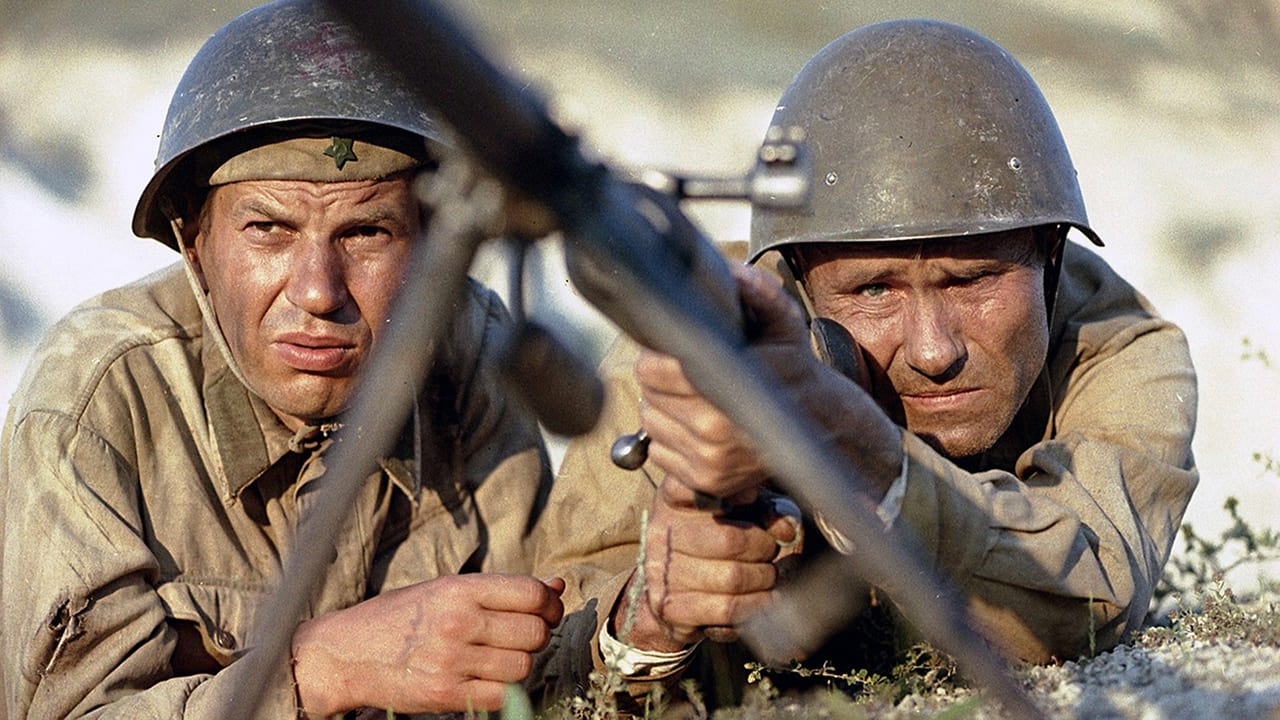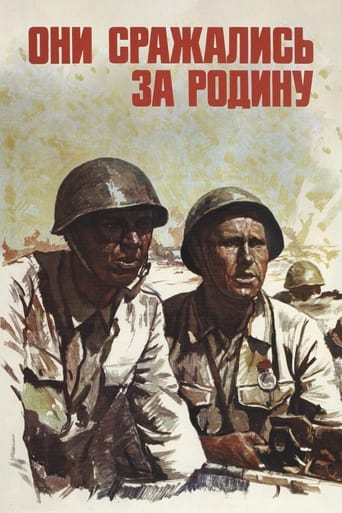

This movie really surprised me. I discovered I was unfair when I underestimated the creative capacity of the soviet cinematographic industry -very well represented here by Sergei Bondarchuk. "A soviet movie released 30 years after WW2? Total bias and cheap nationalism", I thought when I crossed this piece. What I watched, on the other side, is a verisimilar and vanguardist view of the Eastern Front; a work more tied to denounce than to exaltation.The resistance of a maimed and disoriented small unit is the perfect background for Sergei; it's a soft earth garden ready to receive the seeds of war. This is the first time I see such good exploration of soldiers' emotions. The scenes reveal the human inside the uniform, the virtues and vices. The one who fears, hesitates and finds refuge in laugh is the protagonist of "They fought for their motherland". Vasiliy Shukshin (the soldier "Lopakhin") doesn't give life to its character; he borrows the life of real people, of thousands of displaced russians who fought under severe conditions and created a whole new living style in the front. The other actors were also convincing. The siberian soldier misses his wife, Lopakhin's partner sees death in everything, Nikolay can't be distracted from his pessimistic convictions, Lopakhin himself feels extremely bad before the death of a youngster... All those marginalized emotions are well illustrated through a touching realism.Furthermore, Sergei manages to create meaningful symbolisms. The running engine of the upside down tank predicts the empty fate of Wehrmacht, whose ruthless advance isn't translated into a real move, i.e. goes nowhere. The insistence of the young nurse is the best expression of the faith deposited in each soldier. The hard words of the old woman aren't supposed to rise the "mother-loses-sons" cliché, but to reinforce the necessity of fighting the enemy at all costs, of shedding blood. The blood that flows from Nikolay's ear in the last scene marks the legacy of the war, the experiences and sorrows that won't be forgotten. The soviet flag is not unfurled until the final, which could mean the glory of the motherland isn't complete until every single soldier bow down to duty.I could pass the whole day talking about this movie, but I fear I don't have much space here. This way, I'll be quickly with the other details: the scenery is very immersive; the music is somewhat exaggerated sometimes, though correctly placed; and panzers' strength isn't well described, since a single AT rifle shot (15mm, maybe?) would not destroy a tank. Actually, this two last points are my only criticism and will not influence significantly my final rate. Summarizing, Bondarchuk used all his geniality and resources to create this masterpiece of war cine. All the adversities the conventional heroes would not face are presented to the spectator. The excellence of war and all honour issues are undone; I could be one of those guys and you also. War realism at its best. I would be unfair again if I gave this less than 9.
... View MoreI don't understand why I had never heard of this film before. It was by accident that I found it, so I gave it a whirl.And Wow! I think you could write a novelette on what makes this a great film. There's just too much to say in a review, so I'll be general.This war film is about Russians fighting against Germans in World War II. In ways, it is much like old American World War II films, with the spotlight on a small group of soldiers in one unit.The director does so much that is superior that I can't even begin to start on his achievement here.The film shows us the reality of war, including the "down time" in between conflicts, when soldiers peruse the low points.Yet we are never bored, even when the action is supplanted by drama. The reason is that the script is so well written, and I must also congratulate whomever translated this into English for me, because its dialog would make any American film writer jealous.One of the clever things our writer-director team does is keep the reality in the beginning by not letting us know who will survive, and who may be a central character.Two characters dominate the story, a lady's man and a cook. However, the other characters are also spectacular.What really makes this film work is the humor, a dark humor, but a realistic one, and one that will make you laugh and cry and the same time. When one old veteran tells the story of his trench disease, you'll laugh along with the other soldiers. It's one of those stories that is Hell when you live it, but hilarious when you tell it after the war.For me, the magical part is something that I can't say without a spoiler.The camera work is amazing. The drama is amazing. The theatrics is amazing. Okay, it's all amazing.
... View More"The time is fast approaching when to call a man a patriot will be the deepest insult you can offer him. Patriotism now means advocating plunder in the interest of the privileged classes of the particular State system into which we have happened to be born." - Leo Tolstoy "Heroism on command, senseless violence, and all the loathsome nonsense that goes by the name of patriotism - how passionately I hate them!" - Albert Einstein "Patriotism is a pernicious, psychopathic form of idiocy." - George Bernard Shaw The legendary Sergei Bondarchuk directs "They Fought For the Motherland", a war film set in Russia during the second half of 1942. The film opens with a magnificent shot, a prowling camera gliding through swaying fields of wheat before finding the exhausted Soviet army trudging through a canyon far below. They're in full retreat, having been recently crushed by the invading might of a German Panzer division.We then spend some time with the men, watching as they rest and recuperate. They chat and trade stories, before their commander selects a few for a special mission. Turns out our heroes have been ordered to hold a ridge, their small infantry regiment tasked with holding back the German forces so that their exhausted comrades may withdraw back to Stalingrad, where the Russians are preparing to make an epic final stand. Sam Fuller did this sort of "rag-tag rear guard group of soldiers vs an approaching enemy horde" thing better and with more nuance and complexity, but Bondarchuk is the better visualist. His camera conveys the sheer boredom and exhaustion of these men, and his battle scenes are at times impressive, the expansiveness of the Russian countryside lending his battles a scale which most British and American war productions lack.The film eventually settles down into a predictable rhythm, alternating between giant battles and intimate moments of downtime, Bondarcuk allowing his cast's sentiments, fears and attitudes to gently unfold whenever the bullets aren't flying. The film reduces war to the usual traits - everyman soldiers, fatigue, fear, fun, friendship, boredom, heroism, horror, death, homesickness, cowardice, orders etc – and like most of these films, its attempts at portraying war with "balance" and "truth" can't mask how myopic it ultimately all is. A more poetic version of "Saving Private Ryan", the film was financed by the state and the Russian ministry of defence and serves only to glorify war, heroism, compliance, servitude, and act as a low-key form of propaganda.Like "Saving Private Ryan", the film also ends with sad shots of the Russian flag, close ups of the battered faces of warriors, old men dropping to their knees, utilises various subtle tactics toward propagandistic ends and sports a narrative in which we're manipulated into morning the loss of our everyman heroes, who bravely stood up against foes superior in number. By the time the film ends, a throwaway line urging us to hate our enemies, akin to "Ryan's" nationalistic/militaristic "earn this", goes by almost unnoticed. 7/10 – Worth one viewing.
... View MoreRussian production. Genre ; WW 2 drama.1975. Based on the novel by Mikhail Sholokhov. Screenplay and direction by Sergei Bondarchuk with Vasili Shukshin ( as Poitr Lopakhin ), Vyaheslav Tikhonov ( as Nikolay Strltsov ), Sergei Bondarchuk ( as Ivan Zvyagintsev ), Georgi Burkov ( as Alexandr Kopytovskij ), Nikolai Gubenko ( as the Lieutenant ), Yuri Nikulin ( as Nekrasov ), Ivan Lapikov ( as Poprischenko ) & Nonna Mordyukova ( as Natalya Stepanova ). The film is based on the book by Nobel Prize winning author Mikhail Sholokhov. The action is set in Russia in July of 1942. The exhausted Soviet army was in full retreat against the might of the invading German Panzer divisions. A decision is to hold a ridge with what is left of an infantry regiment near a small village on the banks of the River Don, to allow the exhausted remnants of the army enough time to withdraw across the river and help fortify Stalingrad for the decisive battle that must come.The loss of Russian life during the campaign was horrific and while there are some impressive set battle pieces, the film concentrates on the exploits of half a dozen or so soldiers from the shattered regiment, who must not retreat even in the face of the Panzers' greater fire power. The film depicts the thoughts and fears of the individual soldiers in the face of the impending battle, and their thoughts of their Mother Russia as well. While the battles rage, the viewer is not only shown the inhumanity of the conflict, but also the strong personal bonds that develop between comrades in arms in a deadly conflict. There is also plenty of humor in the script, even if it is often grim and tinged with violent overtones. Vasili Shukshin ( as Poitr Lopakhin ) takes the acting honors, with a character that is as much larrikin as it is proletariat.
... View More